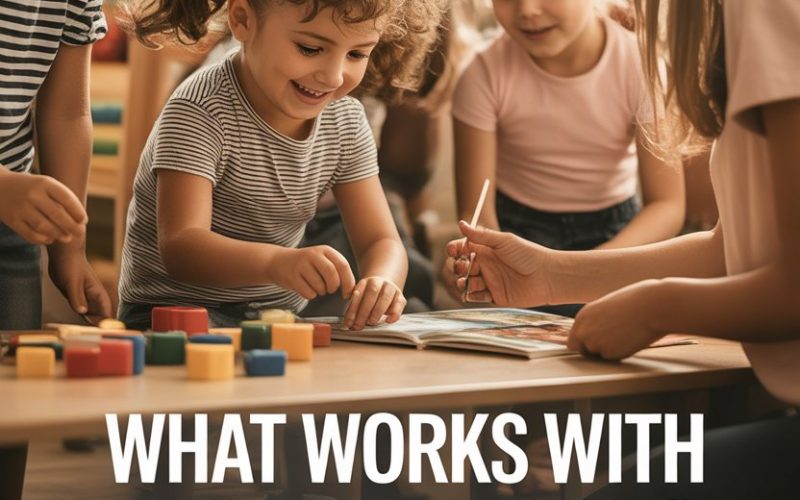“Why can’t you just sit still for five seconds?”
If you’ve found yourself whisper-screaming this into your coffee at 7:12 a.m., welcome.
Parenting a child with ADHD is one of those rollercoasters where the loop-the-loops come before you’ve even had time to buckle your seatbelt.
You want to help your child thrive, but the usual parenting tricks? They don’t always land.
So, what actually helps—and what’s about as effective as a chocolate teapot? Let’s get into it.
Clear, Concise Instructions Actually Land
Complex, multi-step instructions and ADHD are like oil and water.
When you say, “Put your shoes on, grab your bag, turn off the lights, and meet me at the car,” your child hears, “Put your sh—[static]…car.” The rest is lost in the haze.
Simple wins the race here. Stick to one direction at a time. “Shoes on, please.” Wait. Once that’s done: “Bag next.” Rinse and repeat.
Not only are you reducing frustration for both of you, but you’re also setting your child up to succeed. Consistency with this method builds confidence, and let’s face it, anything that trims morning chaos is a bonus.
Routines Work—But Only When They’re Flexible
Routine is the holy grail for families managing ADHD. But rigid, military-style schedules? Not so much.
Life’s messy, and ADHD brains are particularly allergic to monotony.
Try anchoring the day with predictable touchpoints—morning, after school, bedtime—but don’t panic when things go sideways. Some families find visual schedules with pictures or icons helpful.
If suddenly there’s a meltdown because banana pancakes aren’t on the menu, roll with it. Adaptability is your friend.
And here’s a secret: It’s not cheating to use timers or phone alarms.
These can act as gentle nudges through transitions, giving kids (and, let’s be honest, grown-ups) the reminder they need without nagging.
Rewards and Praise Actually Motivate
Positive reinforcement is pure gold. ADHD brains are wired to crave stimulation, and the right reward system can capture their attention like nothing else.
The key? Make it immediate and meaningful.
Waiting a week for a sticker chart to fill up? That’s an eternity. Instead, try “catching” your child the moment they’re showing effort or self-control.
Verbal praise, a high-five, or a few extra minutes of screen time can work wonders.
Researchers back this up: Immediate, consistent reinforcement boosts motivation in kids with ADHD. Just keep the praise specific (“I noticed you packed your school bag without being asked!”) rather than generic.
Nagging, Threats, and Shame Don’t Work (And Sometimes Backfire)
It’s tempting to go full sergeant-major when nothing seems to stick. But constant reminders, raised voices, and the never-ending parade of, “How many times have I told you…?” tend to make things worse.
Kids with ADHD already know they’re struggling. They live with it every day.
The more they feel criticised, the more likely they are to tune out, act out, or develop anxiety. Shame is not a motivator—it’s an anchor.
Emphasise connection over correction. When things unravel, reset together. A quick hug or shared laugh has far more staying power than a guilt trip.
Movement Is Magic
Ever see your child doing cartwheels across the living room during maths practice? They’re not being disrespectful. Their bodies are searching for stimulation.
Movement can actually help ADHD brains focus.
If you can, build in regular ‘wiggle breaks’ throughout the day. A few laps around the kitchen, a five-minute dance party, or stretches between tasks can help your child regulate their attention.
Some teachers even swear by fidget tools or standing desks in the classroom, and the research supports these strategies.
Worried about your lounge looking like a gymnasium? Pick a few specific ‘movement spots’ or times to channel the energy. You’re not raising a tornado—just a child who learns best in motion.
Medication Can Help—But It’s Not a Magic Wand
You’ve probably heard stories from both extremes: medication is either a lifesaver or the villain in a cautionary tale. The reality? Every child’s brain is different.
Stimulant medications are often effective, but they aren’t a cure-all. For many families, a thoughtful approach (with input from a specialist) can help kids focus, manage impulses, and succeed in school.
Some children need to try a few options or adjust dosages to find a good fit.
Be prepared for trial and error—and don’t be afraid to speak up about side effects or concerns. It’s a team effort. And for some, therapy or behaviour support works just as well, or better.
Screen Time: Handle With Care
Screens can be both a sanity-saver and a trapdoor. Used well, tech offers engaging ways to learn, socialise, or relax.
Yet endless gaming or YouTube binges can fuel hyperactivity, meltdown cycles, and sleep battles.
Try setting clear, consistent limits around screens, with visual timers if needed. Co-view when you can—watching together opens up chances to talk about what they’re seeing or playing.
Some families notice better self-regulation when screens are earned after physical play, chores, or social time.
And don’t feel guilty for the occasional extra episode when you just need a breather. We’ve all been there.
Diet and Exercise—Small Tweaks, Big Impact
No, you don’t have to go full kale smoothie. But there’s a growing body of evidence suggesting that what your child eats—and how much they move—can influence ADHD symptoms.
Protein-rich breakfasts, complex carbs, and omega-3s have been linked with better focus. Meanwhile, skipping meals or loads of sugar can trigger crashes or impulsivity.
If your child has a food sensitivity, it’s worth flagging with your GP.
Regular physical activity has a powerful effect, too. Even a brisk walk after tea can help calm busy brains and make bedtime less of a battle.
Sleep: The Unsung Hero
Getting an ADHD child to sleep can feel like trying to bathe a cat. Yet quality sleep is crucial for self-regulation, learning, and mood.
Create a wind-down ritual—think dim lights, a predictable order of events, and soothing activities (stories, gentle music, cuddles). Keep screens out of bedrooms if possible, as blue light messes with natural sleep cycles.
If sleep struggles persist, speak with your paediatrician. Sometimes underlying issues like sleep apnoea or anxiety are at play, and a little medical sleuthing goes a long way.
School Support: Advocate, Don’t Agonise
School is often the battleground for kids with ADHD. Teachers may mistake inattention for laziness, or ignore the real reasons behind ‘behaviour issues.’
Stay in touch with your child’s educators. Share what works at home, and ask how you can support each other.
For some children, a formal plan (like an IEP or 504 in the US or an EHCP in the UK) ensures access to accommodations—extra time, movement breaks, or quiet spaces.
Plenty of parents worry about being that parent. The truth? Clear, constructive communication helps everyone.
You’re not asking for special treatment—just a fair shot at learning.
When To Seek Extra Help
Parenting an ADHD child is not a solo sport. If you’re running on fumes, or your child’s difficulties are affecting family life, friendships, or self-esteem, don’t hesitate to call in reinforcements.
Therapists, coaches, or parent support groups can offer fresh strategies and solidarity. There are also online resources like CHADD and ADDitude Magazine packed with advice from experts and other families living this reality.
Sometimes, just hearing “me too” from another parent can make all the difference.
You’ve Got This (Even When It Feels Like You Don’t)
No two ADHD kids are alike. What works wonders for one might flop spectacularly for another.
You are the expert on your child, even when it feels like you’re guessing.
Celebrate the wins, no matter how small. Forgive yourself for the off days (spoiler: we all have them).
And if you’re ever in doubt, just remember: the parent reading ADHD articles at midnight is already doing a phenomenal job.
The rollercoaster might not slow down, but with a few tricks up your sleeve—and a sense of humour intact—you can help your child shine, quirks and all.




